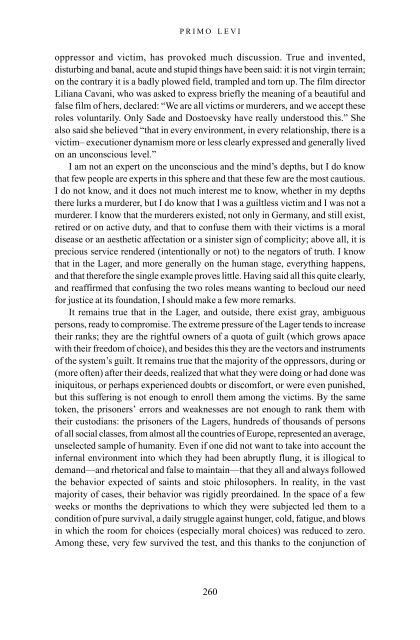The_Holokaust_-_origins,_implementation,_aftermath
The_Holokaust_-_origins,_implementation,_aftermath
The_Holokaust_-_origins,_implementation,_aftermath
You also want an ePaper? Increase the reach of your titles
YUMPU automatically turns print PDFs into web optimized ePapers that Google loves.
PRIMO LEVI<br />
oppressor and victim, has provoked much discussion. True and invented,<br />
disturbing and banal, acute and stupid things have been said: it is not virgin terrain;<br />
on the contrary it is a badly plowed field, trampled and torn up. <strong>The</strong> film director<br />
Liliana Cavani, who was asked to express briefly the meaning of a beautiful and<br />
false film of hers, declared: “We are all victims or murderers, and we accept these<br />
roles voluntarily. Only Sade and Dostoevsky have really understood this.” She<br />
also said she believed “that in every environment, in every relationship, there is a<br />
victim– executioner dynamism more or less clearly expressed and generally lived<br />
on an unconscious level.”<br />
I am not an expert on the unconscious and the mind’s depths, but I do know<br />
that few people are experts in this sphere and that these few are the most cautious.<br />
I do not know, and it does not much interest me to know, whether in my depths<br />
there lurks a murderer, but I do know that I was a guiltless victim and I was not a<br />
murderer. I know that the murderers existed, not only in Germany, and still exist,<br />
retired or on active duty, and that to confuse them with their victims is a moral<br />
disease or an aesthetic affectation or a sinister sign of complicity; above all, it is<br />
precious service rendered (intentionally or not) to the negators of truth. I know<br />
that in the Lager, and more generally on the human stage, everything happens,<br />
and that therefore the single example proves little. Having said all this quite clearly,<br />
and reaffirmed that confusing the two roles means wanting to becloud our need<br />
for justice at its foundation, I should make a few more remarks.<br />
It remains true that in the Lager, and outside, there exist gray, ambiguous<br />
persons, ready to compromise. <strong>The</strong> extreme pressure of the Lager tends to increase<br />
their ranks; they are the rightful owners of a quota of guilt (which grows apace<br />
with their freedom of choice), and besides this they are the vectors and instruments<br />
of the system’s guilt. It remains true that the majority of the oppressors, during or<br />
(more often) after their deeds, realized that what they were doing or had done was<br />
iniquitous, or perhaps experienced doubts or discomfort, or were even punished,<br />
but this suffering is not enough to enroll them among the victims. By the same<br />
token, the prisoners’ errors and weaknesses are not enough to rank them with<br />
their custodians: the prisoners of the Lagers, hundreds of thousands of persons<br />
of all social classes, from almost all the countries of Europe, represented an average,<br />
unselected sample of humanity. Even if one did not want to take into account the<br />
infernal environment into which they had been abruptly flung, it is illogical to<br />
demand—and rhetorical and false to maintain—that they all and always followed<br />
the behavior expected of saints and stoic philosophers. In reality, in the vast<br />
majority of cases, their behavior was rigidly preordained. In the space of a few<br />
weeks or months the deprivations to which they were subjected led them to a<br />
condition of pure survival, a daily struggle against hunger, cold, fatigue, and blows<br />
in which the room for choices (especially moral choices) was reduced to zero.<br />
Among these, very few survived the test, and this thanks to the conjunction of<br />
260



